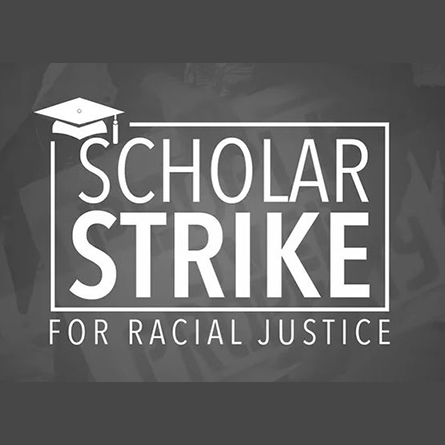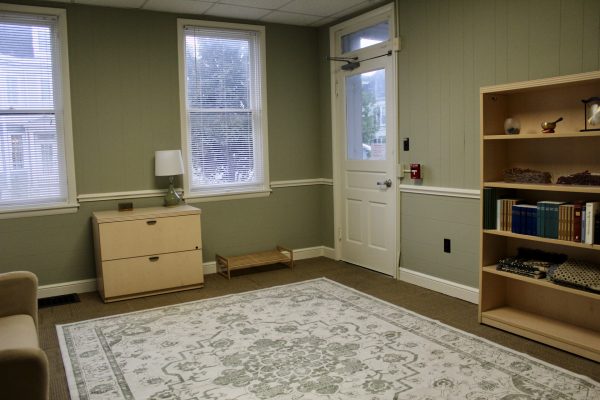Students and Faculty Participate in Nationwide Scholar Strike

Faculty and students took part in a nationwide Scholar Strike September 8th and 9th to bring awareness to systematic racism and injustice in the United States.
The strike was inspired by the Men’s and Women’s National Basketball Association, Quarterback and Activist Colin Kaepernick, and other athletes with the goal to bring the discussion to the classroom.
Anthea Butler, a professor at the University of Pennsylvania, first envisioned the #ScholarStrike in a tweet, writing “I would be down as a professor to follow the NBA and Strike for a few days to protest police violence in America” on August 26. Within several hours, Butler had a co-coordinator and a date set for the strike, along with commitment from hundreds of institutions.
Faculty, administrators, staff, undergraduate, and graduate students from colleges across the country were invited to participate to show their commitment to anti-racism and their support of racial justice for people of color in society. Participants demonstrated by abstaining from responsibilities and instead undertaking measures intended to prompt movements against policing, racism, mass incarceration, and other manifestations of racial injustice in the United States. Others decided to participate in the strike by dedicating the day’s lessons to anti-racist material and discussions to raise awareness.
Professors and students at Dickinson participated and experienced the strike in a variety of ways. Italian and Film Studies Professor Nicoletta Marini-Maio changed her curriculum for her “Dickinson Wears Prada” class to help educate her students on systemic racism in the fashion industry.
“My main goal for the strike was that they learn how to apply [semiotic or cinematic analysis to] systemic racism in the contemporary world,” Marini-Maio said. She also expressed her outrage at the racial injustice and police brutality in the United States. “I stand in solidarity with my students of color and with my colleagues and Dickinson employees,” she said.
Amy Farrell, professor of american studies and women, wender, and sexuality studies, echoed Marini-Maio’s concerns. Farrell participated in the #ScholarStrike by continuing to hold classes and office hours to create less disruption for her students in a time of constant change. “I felt this was especially important as my classes—History of American Feminism, Feminist Practices, and the Senior Seminar in American Studies— [as they] are all about power structures, resistance to inequities, [and] challenges to violence,” she said.
“I thought it was important to highlight that the Scholar Strike was happening, as it was faculty from around the country working together to say, enough. We can’t go on as if business is just usual,” Farrell said.
Provost and Dean of the College Neil Weissman spoke on the administration’s efforts to honor the strike, noting that they had a department chair meeting scheduled for Tuesday, September 8th that was moved to Thursday, the 10th “so the faculty that chose to can focus on the strike.”
“At this stage, I don’t how many faculty are participating, and I don’t know in what ways,” said Weissman, although he noted that one of the options for the strike included professors teaching their class as scheduled as long as they participated in other activities associated with the strike.
The results were mostly positive for two students who experienced the strike in changes to their curriculum and education about the strike. When asked if the strike had been disruptive, Rachel Prince ’21 stated, “No, if anything, the curriculum has become more relevant. [M]ore tangible.” Two of her educational studies professors changed the homework for their classes into class discussions about policing in higher education.
Although she had two education classes canceled, Prince noted that the Educational Studies Department “was very transparent and communicative with us all” before the strike. This attention to transparency was not the case for all students who experienced the strike.
Sadie Fowler ’22 expressed her frustration with one of her professors who “justified their reasoning not to [cancel class], making it sound like it [didn’t] matter whether or not they participated, which was difficult to hear as it seemed to ignore the point of the Scholar Strike.”
However, in the one class where Fowler’s professor changed their lesson to watch a documentary related to the strike, Fowler stated that this change was “extremely informational and beneficial.”
“It is important that professors acknowledge the difficult times, particularly as Dickinson is a predominately white institution (PWI) and for the professors to recognize their own privilege,” Fowler said.
More information on the scholar strike can be found at https://www.scholarstrike.com



